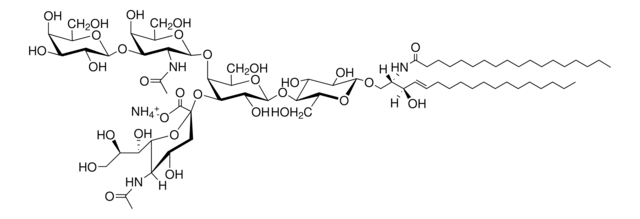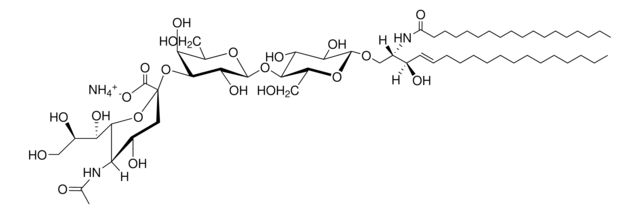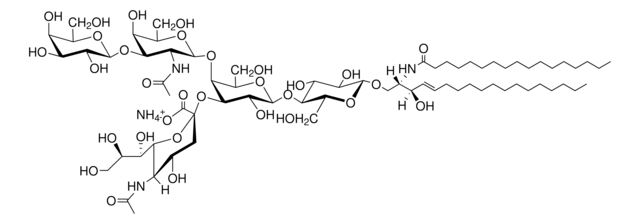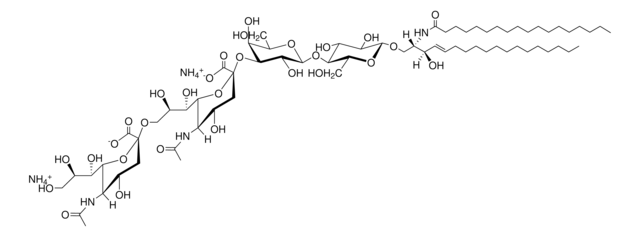G5642
Monosialoganglioside GM3 from canine blood
≥98%, lyophilized powder
Sign Into View Organizational & Contract Pricing
All Photos(1)
About This Item
Recommended Products
Quality Level
Assay
≥98%
form
lyophilized powder
solubility
chloroform/methanol/water (9.5:9.5:1): 20 mg/mL, clear, colorless to light yellow
storage temp.
−20°C
Looking for similar products? Visit Product Comparison Guide
Related Categories
General description
Gangliosides are major constituents of neuronal cell membranes and endoplasmic reticulum. They contain a sialated polysaccharide chain linked to ceramide through a β-glycosidic linkage. For classification of gangliosides see Svennerholm, L., et al. (eds.), Structure and Function of Gangliosides, New York, Plenum, 1980.
Application
Monosialoganglioside GM3 from canine blood has been used as a reference standard in high-performance thin-layer chromatography (HPTLC) to analyze ganglioside signatures of prostate cancer (CaP) cells. It has also been used to determine ganglioside-binding profiles of methylotrophic yeast (Pichia pastoris) secreted cholera toxin B subunit (PpCTB) by enzyme-linked immunosorbent assay (ELISA).
Biochem/physiol Actions
Monosialoganglioside GM3 has a potential role in cancer development and progression. Increased expression of GM3 has been observed in various types of cancer. Hence, it is used as a tumor-associated carbohydrate antigen during cancer vaccine development.
Monosialoganglioside-GM3 is the most common ganglioside and the major ganglioside in non-neuronal cell membranes. It inhibits epidermal cell growth and is involved in the biosynthesis and metabolism of all higher gangliosides.
Analysis Note
The product is soluble at 20 mg/mL in a 1:1 mixture of chloroform and ethanol with 5% water. The resulting solution is colorless
Storage Class Code
11 - Combustible Solids
WGK
WGK 3
Flash Point(F)
Not applicable
Flash Point(C)
Not applicable
Personal Protective Equipment
dust mask type N95 (US), Eyeshields, Gloves
Choose from one of the most recent versions:
Already Own This Product?
Find documentation for the products that you have recently purchased in the Document Library.
Customers Also Viewed
Mepur H Ravindranath et al.
Biochemical and biophysical research communications, 324(1), 154-165 (2004-10-07)
Prior development of a unique androgen-receptor (AR)-negative cell line (HH870) from organ-confined (T2b) human prostate cancer (CaP) enabled comparison of the gangliosides associated with normal and neoplastic prostate epithelial cells, organ-confined versus metastatic (DU 145, PC-3), and AR-negative versus AR-positive
Annemieke de Jong et al.
Nature immunology, 15(2), 177-185 (2013-12-24)
T cells autoreactive to the antigen-presenting molecule CD1a are common in human blood and skin, but the search for natural autoantigens has been confounded by background T cell responses to CD1 proteins and self lipids. After capturing CD1a-lipid complexes, we
Articles
Discover Bioactive Small Molecules for Lipid Signaling Research
Our team of scientists has experience in all areas of research including Life Science, Material Science, Chemical Synthesis, Chromatography, Analytical and many others.
Contact Technical Service









